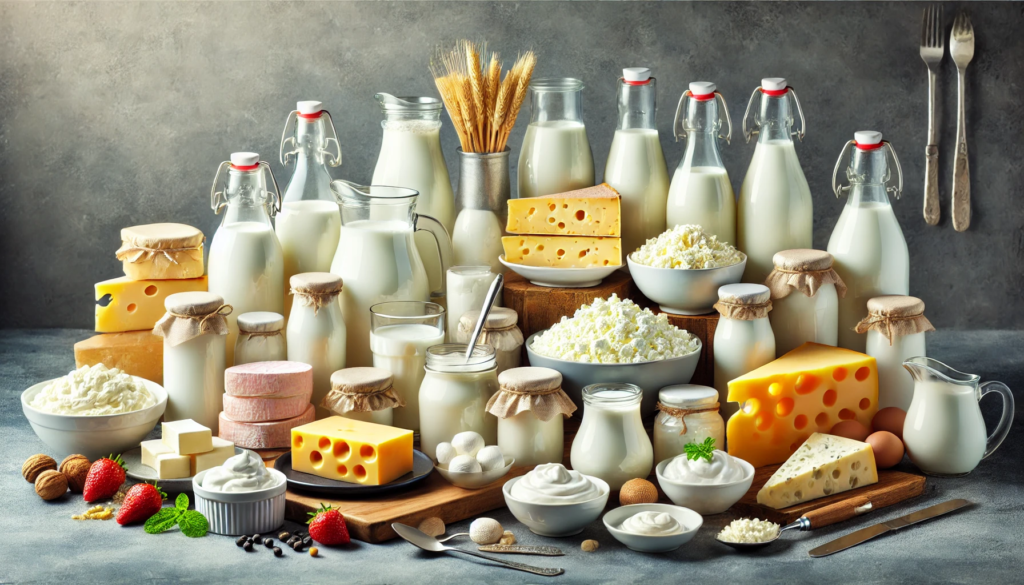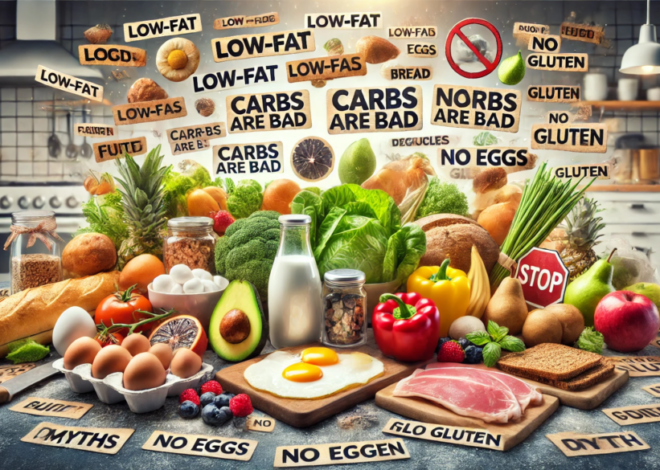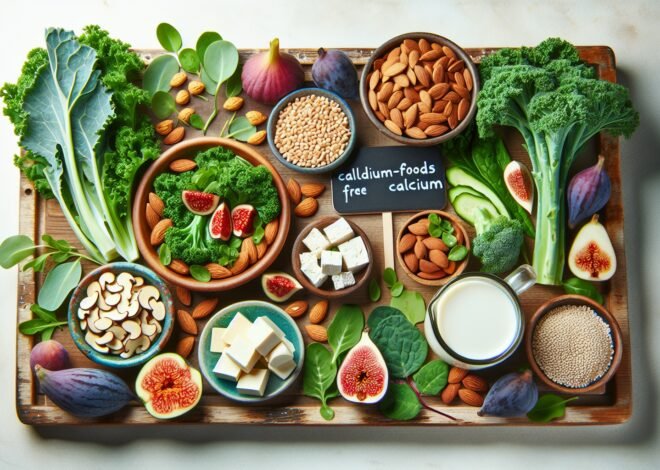
Top 20 Dairy Products for a Healthy and Balanced Diet
Dairy products are an excellent source of essential nutrients like calcium, protein, and vitamins, which are crucial for maintaining strong bones, teeth, and overall health. Incorporating a variety of dairy options into your diet can help you achieve a balanced and nutritious meal plan. Here are the top 20 dairy products that you should consider adding to your diet for optimal health.
1. Milk
Milk is a staple dairy product and one of the most well-known sources of calcium, vitamin D, and protein. It helps build strong bones and supports muscle function. Whether you prefer whole, low-fat, or skim milk, it can be a versatile ingredient used in smoothies, cereals, or simply as a drink.
Fortified milk is an excellent option for those who need additional vitamin D to help with calcium absorption and bone health.
2. Greek Yogurt
Greek yogurt is a popular dairy product rich in protein and probiotics, which promote gut health. It contains less sugar than regular yogurt and is packed with essential nutrients like calcium, magnesium, and vitamin B12. Greek yogurt’s thick and creamy texture makes it ideal for breakfast, snacks, or even as a healthy substitute for sour cream.
Enjoy it with fruits, honey, or granola for a nutritious and filling option.
3. Cheese
Cheese comes in many varieties, and it’s a great source of calcium, protein, and healthy fats. Cheddar, mozzarella, Swiss, and gouda are just a few popular options. While cheese can be calorie-dense, moderate consumption provides important nutrients for bone health and muscle function.
Cheese can be used in sandwiches, salads, or as a snack with whole-grain crackers for a balanced meal.
4. Cottage Cheese
Cottage cheese is an excellent low-calorie dairy product packed with protein and essential nutrients like calcium, phosphorus, and B vitamins. It’s perfect for those looking to build muscle, as its high protein content aids in muscle repair and growth.
Cottage cheese pairs well with fruits like berries or pineapple, or it can be used as a topping for toast or salads.
5. Kefir
Kefir is a fermented dairy product similar to yogurt but with a thinner consistency. It’s rich in probiotics, which support digestive health and boost immunity. Kefir is also a great source of protein, calcium, and vitamins B12 and D.
You can enjoy kefir as a drink on its own or mix it into smoothies for a probiotic boost.
6. Ricotta Cheese
Ricotta cheese is a soft, mild-flavored cheese that is lower in fat than many other cheeses and rich in calcium, protein, and essential amino acids. It’s a great addition to both sweet and savory dishes, from lasagna and pasta to desserts like cheesecake.
Add ricotta to pancakes, spread it on toast, or mix it into pasta sauces for a creamy texture and added nutrients.
7. Parmesan Cheese
Parmesan cheese is a hard, aged cheese known for its intense flavor. A small amount provides a concentrated source of calcium, protein, and phosphorus, making it a powerful addition to your meals.
Grate parmesan over salads, pasta, or soups for an extra burst of flavor and nutrition.
8. Butter
Butter, when consumed in moderation, can be a valuable source of fat-soluble vitamins such as A, D, E, and K2. It also contains healthy fats that support brain function and cell health. Opt for grass-fed butter, which has higher levels of omega-3 fatty acids and antioxidants.
Use butter sparingly in cooking or as a spread, balancing it with other healthy fats in your diet.
9. Mozzarella
Mozzarella is a fresh cheese with a soft, creamy texture and mild flavor. It’s lower in sodium and fat compared to other cheeses, making it a healthier option. Mozzarella is rich in calcium and protein and works well in a variety of dishes.
Use mozzarella in salads, sandwiches, or as a topping for pizza and pasta for a lighter cheese option.
10. Sour Cream
Sour cream is a fermented dairy product that adds a tangy flavor to dishes. While it is higher in fat, it can still be a part of a balanced diet when used in moderation. Sour cream is a good source of calcium and contains probiotics, which support gut health.
Use it as a topping for baked potatoes, tacos, or in dips and sauces.
11. Cream Cheese
Cream cheese is a soft, spreadable cheese that provides a rich source of calcium and healthy fats. Although it’s higher in fat than other dairy products, it can still be enjoyed in moderation as part of a balanced diet.
Spread cream cheese on whole-grain bagels, or use it in recipes for cheesecakes or dips.
12. Ghee
Ghee is clarified butter that is commonly used in Indian cuisine. It has a high smoke point, making it ideal for cooking. Ghee is rich in fat-soluble vitamins like A, D, and K2 and contains butyrate, a fatty acid known for its anti-inflammatory properties.
Use ghee for frying or sautéing vegetables, or spread it on toast for a flavorful and nutritious fat source.
13. Yogurt
Regular yogurt is a well-loved dairy product that provides protein, calcium, and probiotics to support digestive and immune health. It’s a versatile option that can be used in smoothies, dressings, or eaten on its own with toppings like nuts and fruits.
Choose plain, unsweetened varieties to avoid added sugars and maximize its health benefits.
14. Skyr
Skyr is an Icelandic dairy product similar to Greek yogurt but with an even thicker consistency. It’s low in fat and high in protein, making it an excellent choice for those looking to increase their protein intake while maintaining a balanced diet.
Enjoy skyr with fresh fruit, honey, or as part of a high-protein breakfast or snack.
15. Whey Protein
Whey protein is a by-product of cheese production and is often sold as a powdered supplement. It’s a complete protein source, containing all essential amino acids necessary for muscle repair and growth. Whey protein also supports immune function and helps with muscle recovery post-exercise.
Mix whey protein into smoothies, shakes, or oatmeal for a protein-packed meal.
16. Heavy Cream
Heavy cream is a rich dairy product with a high-fat content, often used in cooking and baking. While it’s more calorie-dense, heavy cream provides important fat-soluble vitamins and can enhance the flavor of various dishes.
Use heavy cream sparingly in soups, sauces, or desserts for a decadent but nutritious option.
17. Buttermilk
Buttermilk is a cultured dairy product that is low in fat and rich in probiotics. It’s traditionally used in baking, but it also works well in marinades and dressings. The probiotics in buttermilk support gut health, while its lower fat content makes it a lighter option compared to other dairy products.
Use buttermilk in pancakes, biscuits, or as a base for creamy salad dressings.
18. Feta Cheese
Feta cheese is a crumbly, tangy cheese made from sheep’s or goat’s milk. It’s lower in fat than many other cheeses and provides a good source of calcium and protein. Feta also contains beneficial probiotics that support digestive health.
Add feta to salads, wraps, or grain bowls for a burst of flavor and added nutrients.
19. Mascarpone
Mascarpone is an Italian cream cheese known for its rich, creamy texture and mild flavor. While it’s higher in fat, it can be enjoyed in moderation as part of a balanced diet. Mascarpone is often used in desserts, like tiramisu, but can also be spread on toast or used in savory dishes.
Incorporate mascarpone into both sweet and savory recipes for a luxurious, creamy texture.
20. Gorgonzola
Gorgonzola is a blue cheese that provides a strong flavor and a rich source of calcium and protein. Like other blue cheeses, it contains probiotics that promote gut health. Gorgonzola is versatile and works well in both salads and sauces.
Use Gorgonzola sparingly to add depth and flavor to dishes like salads, pasta, or cheese boards.
Conclusion
Dairy products offer a wide variety of nutrients essential for maintaining a healthy, balanced diet. Incorporating different types of dairy, from milk and cheese to yogurt and kefir, can provide the calcium, protein, and probiotics needed to support bone health, digestion, and overall wellness. Enjoy these top 20 dairy products in moderation and as part of a balanced meal plan to promote long-term health.
FAQ
1. Are dairy products essential for a healthy diet?
Dairy products are not essential for everyone, but they provide key nutrients such as calcium, vitamin D, protein, and potassium, which are important for bone health, muscle function, and overall well-being. If you have lactose intolerance or follow a vegan diet, you can obtain these nutrients from non-dairy alternatives like fortified plant-based milks, leafy greens, nuts, seeds, and legumes.
2. Which dairy products are best for people who are lactose intolerant?
For those with lactose intolerance, lactose-free dairy options are available, such as lactose-free milk, yogurt, and cheese. Fermented dairy products like kefir and Greek yogurt are also easier to digest due to their lower lactose content. Additionally, hard cheeses like cheddar and parmesan contain very little lactose and can be tolerated by some individuals.
3. What are the health benefits of consuming fermented dairy products?
Fermented dairy products like yogurt, kefir, and some cheeses are rich in probiotics, which support gut health by promoting a healthy balance of beneficial bacteria in the digestive system. These probiotics can improve digestion, boost the immune system, and help reduce inflammation. Fermented dairy products also provide essential nutrients such as calcium and protein, contributing to overall health.
4. How much dairy should I consume daily?
The recommended dairy intake varies by age, gender, and activity level. For most adults, 2 to 3 servings of dairy per day is generally recommended to meet calcium and vitamin D needs. A serving could be a cup of milk, a slice of cheese, or a cup of yogurt. However, individual needs may vary, so it’s important to consider your dietary preferences and consult with a healthcare professional.
5. Are full-fat dairy products healthy?
Full-fat dairy products can be part of a healthy diet when consumed in moderation. They contain essential fat-soluble vitamins like A, D, E, and K, and some studies suggest that full-fat dairy may support heart health by promoting healthy cholesterol levels. However, due to their higher calorie content, it’s important to balance full-fat dairy with other nutrient-dense, lower-fat foods to maintain a balanced diet.
6. What are the best dairy products for building muscle?
For muscle-building, dairy products high in protein like Greek yogurt, cottage cheese, and whey protein are ideal. These options contain complete proteins with all nine essential amino acids, which help repair and build muscle after exercise. Drinking milk after a workout is also effective, as it provides a balance of protein, carbohydrates, and fats to support muscle recovery.











